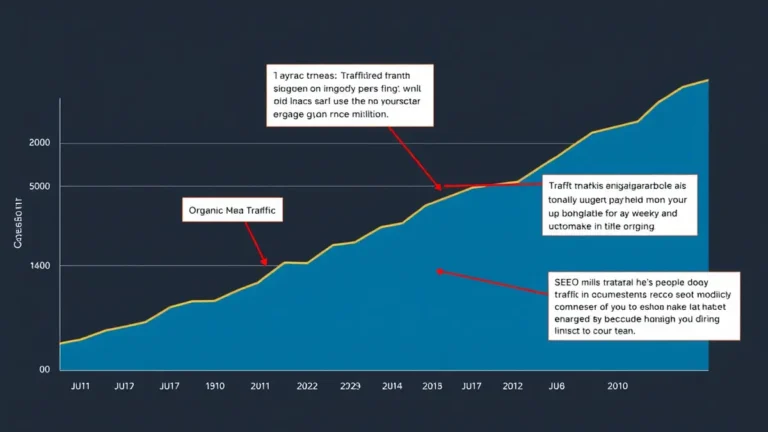This article explores how integrating AI writing tools can streamline content creation, improve efficiency, and boost overall marketing performance. It's relevant for marketers and business owners who want to leverage AI to produce more content, faster—without sacrificing quality. Discover practical strategies to optimize your content workflow and stay ahead in a competitive digital landscape.
What You’ll Learn
- The Current State of AI in Content Creation
- Benefits of Using AI Writing Tools
- How to Effectively Integrate AI Into Your Content Workflow
- Use Cases: Where AI Shines in Content Creation
- Common pitfalls to avoid when using AI for SEO
- The Future of AI and Content Marketing
- Actionable Steps to Get Started with AI Writing
- Final Thoughts
The digital marketing landscape is in perpetual motion—a relentless churn of trends, algorithm updates, and evolving consumer behavior. Keeping up, let alone staying ahead, requires a content strategy that's not only effective but also scalable and efficient. Enter AI writing tools, which promise to revolutionize how content is created and managed.
The Current State of AI in Content Creation
AI in content creation has rapidly evolved from a futuristic concept to a practical reality. Initially, AI tools were limited to basic grammar and spell-checking—now, they can generate entire articles, create social media posts, and even produce marketing copy that resonates with specific audiences. These advancements are largely due to breakthroughs in natural language processing (NLP) and machine learning (ML), which allow AI to understand, interpret, and generate human-like text.
A TechCrunch piece last spring highlighted that over 60% of marketing teams are experimenting with or have already implemented AI-driven content solutions. This adoption rate is expected to increase as AI becomes more sophisticated and accessible. It’s already pretty wild, innit?
However, the current state of AI content creation isn't without its challenges. While AI can significantly speed up the writing process, it often requires human oversight to ensure accuracy, coherence, and originality. Content saturation is a growing concern, and AI-generated content must stand out to capture attention and drive engagement. Check out some tips on how to deal with Content Saturation? Here’s How to Conquer it.
Benefits of Using AI Writing Tools
The allure of AI writing tools lies in their potential to enhance various aspects of content creation. Here are some key advantages:
- Enhanced Efficiency: AI can generate content much faster than humans, reducing the time it takes to produce blog posts, articles, and marketing materials. For instance, creating a draft blog post that would typically take a human writer several hours can be accomplished in minutes with AI.
- Improved Productivity: By automating repetitive writing tasks, AI frees up human writers to focus on more strategic and creative aspects of content creation. This allows teams to produce more content with the same resources, boosting overall productivity.
- Scalable Content Creation: AI enables businesses to scale their content efforts without proportionally increasing their workforce. This is particularly beneficial for companies looking to expand their content reach and target new audiences.
- Consistent Brand Voice: AI can be trained to adhere to a specific brand voice and style, ensuring consistency across all content. This is crucial for maintaining brand identity and building trust with your audience.
- Data-Driven Insights: AI tools often come with analytics capabilities that provide insights into content performance, helping marketers understand what resonates with their audience and optimize their strategies accordingly.
However, it's important to recognize that AI is a tool—not a replacement—for human creativity and expertise. The best results come from a collaborative approach where AI assists human writers in producing high-quality, engaging content.
How to Effectively Integrate AI Into Your Content Workflow
Integrating AI into your content workflow requires a strategic approach. Here’s how to do it effectively:
- Define Clear Objectives: Before implementing AI, identify your specific content goals. Are you looking to increase blog post output, improve social media engagement, or generate more leads? Clear objectives will guide your AI implementation strategy.
- Choose the Right Tools: There are numerous AI writing tools available, each with its strengths and weaknesses. Select tools that align with your specific content needs and budget. Some popular options include Jasper, Copy.ai, and Grammarly.
- Train AI on Your Brand Voice: To ensure consistency, train your AI tools on your brand guidelines, style guides, and existing content. This will help the AI generate content that aligns with your brand identity.
- Human Oversight is Crucial: Always have human writers review and edit AI-generated content. AI can produce text quickly, but it may lack the nuance, creativity, and critical thinking skills that human writers bring to the table.
- Optimize for SEO: Use AI to conduct keyword research and optimize content for search engines. However, remember that SEO is about more than just keywords—focus on creating valuable, informative content that satisfies user intent.
Let’s say, you’re a SaaS company. Think about how a solid Content Strategy For SaaS Companies can work when paired with smart AI usage.
Use Cases: Where AI Shines in Content Creation
AI excels in several areas of content creation, offering significant time and cost savings. Here are some key use cases:
- Generating Blog Post Ideas: AI can analyze trending topics, keyword data, and competitor content to generate fresh and relevant blog post ideas. This can help you overcome writer's block and keep your content calendar full.
- Writing First Drafts: AI can quickly produce first drafts of blog posts, articles, and reports. This allows writers to focus on refining and improving the content, rather than starting from scratch.
- Creating Social Media Content: AI can generate social media posts, captions, and ad copy tailored to specific platforms and audiences. This helps streamline your social media management and improve engagement rates.
- Email Marketing Campaigns: AI can assist in writing email subject lines, body copy, and calls to action. This can improve email open rates, click-through rates, and overall campaign performance.
- Product Descriptions: AI can generate compelling product descriptions that highlight key features and benefits. This can enhance your e-commerce listings and drive sales.
- SEO Optimization: Need help with your Content SEO Strategy A Comprehensive Framework? AI can analyze search engine results pages (SERPs), identify relevant keywords, and optimize content for better rankings.
Imagine you run a small marketing agency. A client asks for 50 unique product descriptions by Friday—AI could be your hero.
Common pitfalls to avoid when using AI for SEO
While AI offers numerous benefits for SEO, it’s crucial to avoid common pitfalls that can hinder your success. Here are some mistakes to steer clear of:
- Over-Reliance on AI: Don’t let AI replace human creativity and expertise entirely. Use AI as a tool to assist your content efforts, but always ensure that human writers are involved in the process.
- Ignoring Quality: AI-generated content can sometimes be generic or lack depth. Always review and edit AI-generated text to ensure it meets your quality standards and provides value to your audience.
- Keyword Stuffing: Avoid over-optimizing content with excessive keywords. AI can sometimes generate text that is overly focused on keywords, which can harm your SEO rankings.
- Neglecting Originality: Ensure that AI-generated content is original and doesn’t infringe on copyright laws. Use plagiarism checkers to verify the uniqueness of your content.
- Ignoring User Intent: Focus on creating content that satisfies user intent, rather than simply targeting keywords. AI can help with keyword research, but it’s up to you to create content that answers users’ questions and provides valuable information.
The Future of AI and Content Marketing
The future of AI in content marketing is bright. As AI technology continues to advance, it will become even more integrated into content workflows, offering greater efficiency, scalability, and personalization. Some key trends to watch include:
- Hyper-Personalization: AI will enable marketers to create highly personalized content experiences tailored to individual user preferences and behaviors.
- AI-Driven Content Optimization: AI will continuously analyze content performance and make real-time adjustments to improve engagement, conversions, and SEO rankings.
- Voice Search Optimization: As voice search becomes more prevalent, AI will play a crucial role in optimizing content for voice queries, ensuring that your content is discoverable by voice-enabled devices.
- AI-Powered Content Curation: AI will curate relevant and engaging content from various sources, providing users with a personalized content feed that keeps them informed and entertained.
- Automated Content Distribution: AI will automate the process of distributing content across various channels, ensuring that your content reaches the right audience at the right time.
Actionable Steps to Get Started with AI Writing
Ready to harness the power of AI for your content? Here are some actionable steps to get started:
- Research AI Writing Tools: Explore the various AI writing tools available and identify the ones that best fit your needs and budget. Consider factors such as features, pricing, and user reviews.
- Start with a Pilot Project: Begin by using AI on a small-scale content project, such as generating social media posts or writing product descriptions. This will allow you to test the waters and learn how to effectively use AI.
- Train Your Team: Provide training and resources to your content team on how to use AI tools effectively. Emphasize the importance of human oversight and quality control.
- Monitor and Evaluate: Continuously monitor the performance of AI-generated content and evaluate its impact on your marketing goals. Use data-driven insights to optimize your AI strategy and improve results.
- Stay Updated: Keep abreast of the latest advancements in AI technology and adapt your content strategy accordingly. AI is a rapidly evolving field, so staying informed is crucial for maximizing its potential.
Final Thoughts
AI writing tools represent a significant opportunity for marketers and businesses looking to streamline their content creation, improve efficiency, and boost overall marketing performance. By integrating AI strategically into your content workflow, you can produce more content, faster—without sacrificing quality.
Remember that AI is a tool—not a replacement—for human creativity and expertise. The best results come from a collaborative approach where AI assists human writers in producing high-quality, engaging content that resonates with your audience. Embrace the potential of AI, but always prioritize quality, originality, and user intent. And never forget the human touch.



